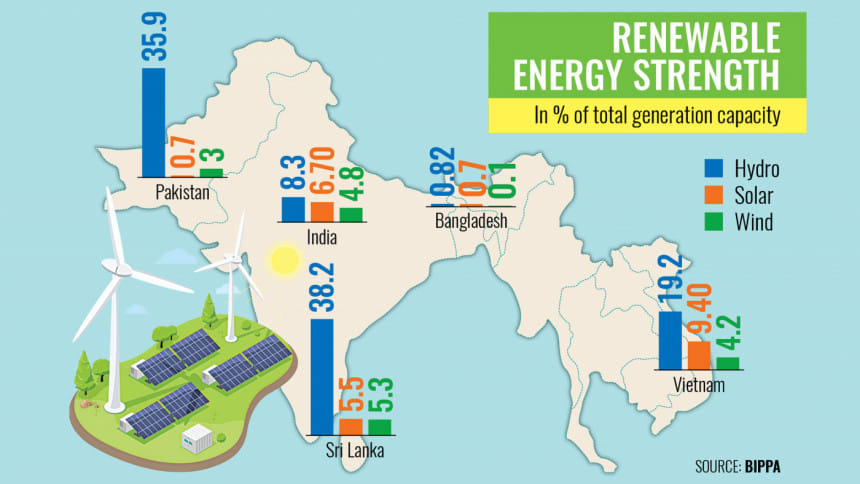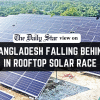Renewable ambitions still mired in uncertainty

Although the Awami League government made ambitious commitments to renewable energy before being ousted by a mass uprising in August last year, meeting those lofty goals remains a distant dream for the country.
The interim government has been trying to accelerate the transition, but experts and businesses have voiced concerns that the new tenders, which do not feature implementation agreements, may hold back progress.
According to an analysis by the Bangladesh Independent Power Producers' Association (BIPPA), Bangladesh produces the least electricity from renewable sources compared to four other comparator countries, including India, Pakistan, Vietnam and Sri Lanka.
Bangladesh's power generation mix is skewed heavily towards fossil fuels, with only 0.8 percent of energy being produced through renewables.
The nearest competitor, Pakistan, gets 3.7 percent of its total 42,131 megawatts (MW) of installed capacity from renewables, according to the findings, which were shared with senior government officials on Monday at Rail Bhaban.
The comparison was based on data till June 2024.
At present, Bangladesh has a total installed capacity of 27,115MW, with solar and wind contributing 663MW.
According to the findings, Vietnam is leading the charge towards renewables, followed by India and Sri Lanka.
In a fresh push, Bangladesh entered the renewable energy era in 2017 with the launch of a 3MW solar power plant in Jamalpur's Sharishabari.
The Awami League government later set a global commitment to producing 6,000-16,000MW from renewable sources by 2030, but neglected due process when it came to giving primary approval.
However, after the political changeover in August, the interim government scrapped the plans for a total of 42 power plant projects, including 37 renewables plants with a combined capacity of around 3,102 megawatts (MW).
This is because those plants were awarded without any due tender process by the Awami League government under the controversial Quick Enhancement of Electricity and Energy Supply (Special Provision) Act 2010.
The interim government also repealed the "indemnity act" in December.
Additionally, under the interim government, the National Board of Revenue granted a 15-year tax benefit for investments to establish grid-tied renewable energy-based power facilities, with a 10-year exemption to encourage the bidders.
The PDB has also floated two tender notices till date for 22 solar plants in different areas of the country with a total capacity of 853MW. The tender submission deadlines for those notices are in early February and March this year respectively.
Shahriar Ahmed Chowdhury, director at the Centre for Energy Research at United International University, told The Daily Star that the previous government always said it would increase renewable energy installation, but those words were insincere.
"Renewable energy installation is good for the nation in the long run as fuel cost will reduce in proportion with renewable use," he said.
Imran Karim, former president of BIPPA, who prepared the analysis, said land scarcity is the main reason solar projects are being held back.
"As a densely populated country, land acquisition is the biggest challenge in implementing renewable projects," he said.
He pointed out another major decision by the government that had caused investors to refrain from joining the tender process.
He said the new tender documents read that the government will not sign implementation agreements, under which the government assures repayments if the PDB defaults.
"That means the companies will only sign power purchase agreements with the PDB. You will rarely find lenders or investors who will agree to invest in a company that they know cannot repay them on time," Karim said.
Currently, the PDB owes around Tk 21,000 crore to independent power producers in overdue payments.
Besides, he said, the PDB sells power to customers for prices lower than their purchase cost or production cost, meaning it is not possible for them to pay bills unless the government underwrites it.
Karim, also the vice-chairman of Confidence Group, which owns several heavy fuel oil-based power plants, said they wanted to support the government's move towards renewables.
"But when we spoke to multilateral banks and development partners, we found out that they may not finance such projects."
Despite repeated attempts over the phone, Muhammad Fouzul Kabir Khan, adviser to the ministry of power, energy and mineral resources, could not be reached for comment.
Energy expert Shahriar Chowdhury said the decision to not ink implementation agreements is contrary to the government's commitment to increasing power generation from renewables.
"Fossil fuel-based power plants have been getting such benefits for a long time. If you want to compete with them, you [the government] should support the renewable investors for a certain time till the situation improves," he said.
"We have made very little progress. Government support is needed until the sector can stand on its own feet," he added.

 For all latest news, follow The Daily Star's Google News channel.
For all latest news, follow The Daily Star's Google News channel. 






Comments